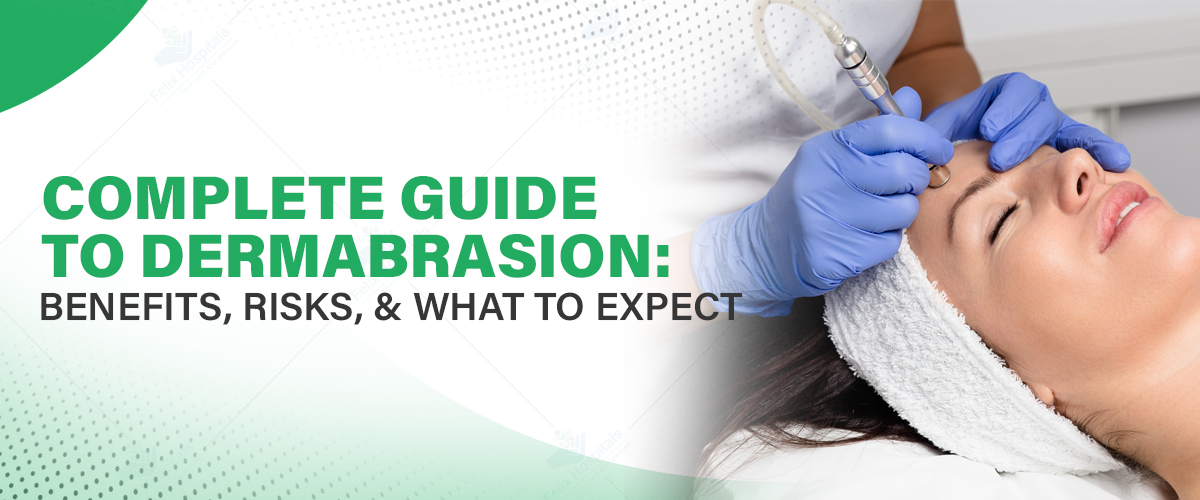
Subscribe to our

Dermabrasion, also called surgical skin planning, is a minimally invasive cosmetic procedure where a dermatologist or a plastic surgeon improves the uneven skin’s texture and appearance by removing its outermost layers using specialized instruments. This technique is often recommended to improve skin contour for treating acne scars, wrinkles, pigmentation, melasma and other skin irregularities. While Dermabrasion offers numerous benefits, understanding the procedure, its risks, and recovery process is essential to achieve the desired results.
Whether you’re considering this treatment for cosmetic purposes or as part of a broader medical plan, it’s important to understand the risks as well as the benefits before you decide if Dermabrasion is right for you. Before exploring the advanced skin treatment, it's important for you to consult only a certified dermatologist or a recognized plastic surgery hospital for Dermabrasion to ensure a safe and effective experience.
Visit our best plastic surgery hospital today to consult with our experts and achieve the skin transformation you desire. For details, contact us at : +(91) 9667064100
Dermabrasion is a cosmetic procedure that makes use of a rotating device to exfoliate and remove the skin’s outer layer. This process promotes the regeneration of new, smoother skin. However, the procedure is not suitable for everyone, particularly those with sensitive skin, active acne, or certain medical conditions. Also, unlike microdermabrasion, which is less invasive, Dermabrasion reaches deeper layers of the skin and requires professional supervision. Therefore, it is important to consult a certified or a qualified doctor only.
This procedure was developed to lessen acne scars but is used to treat a wide range of skin conditions, including:
Even though Dermabrasion improves the skin’s appearance, it is not a cure for all skin conditions. The procedure is suitable for people of all age groups. However, people who have darker skin tone should avoid undergoing the procedure as this treatment could permanently discolor your skin.
Secondly, if your acne is ongoing, Dermabrasion isn’t an option because there’s a risk of infection.
Before undergoing Dermabrasion, a detailed skin analysis is performed by your certified doctor. The diagnosis involves:
1. Medical History: Before suggesting you Dermabrasion, your specialist will review your skin type, history of skin conditions, and any allergies.
2. Physical Examination: A thorough examination of the affected area helps determine the treatment’s feasibility.
3. Patch Test: For individuals with sensitive skin, patch testing ensures there are no adverse reactions.
The Dermabrasion procedure is typically an outpatient procedure. It involves the following steps:
After Dermabrasion you’ll have to do the following to avoid any problems:
There are benefits you may get from Dermabrasion that you may not get from a chemical peel or any other cosmetic procedure. These include:
Dermabrasion is a safe and effective procedure, but like any medical or cosmetic procedure there can be certain risks involved, only if you are:
To maintain the results of Dermabrasion and prevent further skin issues, you'll have to follow tips, such as:
Felix Hospitals offers superior care for Plastic Surgery procedures. With our qualified, experienced staff of surgeons like Dr. Pragya Priya and Dr. Vishvendu Gaur, Dermabrasion, among other contemporary skin treatments, is our expertise. With advanced equipment and concern for the health and well-being of the patient, we deliver a safe, efficient, and customized treatment experience.
Ready to rejuvenate your skin? Schedule a consultation at Felix Hospitals today to explore personalized Dermabrasion solutions designed just for you!
Dermabrasion is an effective solution for improving the skin’s texture, reducing scars, and addressing other visible imperfections. By removing the outer layers of damaged skin, it allows healthier, smoother skin to regenerate. While the procedure offers numerous benefits, consulting an experienced dermatologist or plastic surgeon is essential to assess suitability and minimize risks. With proper aftercare, Dermabrasion can provide long-lasting, transformative results.
Take the first step toward healthier, rejuvenated skin. Book an appointment with the experts at Felix Hospitals now!
1. Is Dermabrasion painful?
Ans: Your skin will be numbed using local anesthesia or a numbing spray during the procedure so that you won’t feel any pain. However, after the procedure if you feel any pain or discomfort, your doctor will prescribe pain medications.
2. What is the recovery time and how soon will I be able to see results after Dermabrasion?
Ans: Depending on your skin type, it will take at least 10-14 days for your skin to heal and a couple of weeks before you’ll see the complete results. Make sure to follow your doctor’s instructions closely while you heal.
3. Are there any side effects associated with Dermabrasion?
Ans: While generally considered to be safe, some side effects associated with Dermabrasion include redness, swelling, enlarged pores and temporary sensitivity. These can be managed with proper care.
4. Will Dermabrasion permanently remove tattoos?
Ans: Yes, the procedure is effective in removing tattoos.
5. How long does the Dermabrasion procedure last?
Ans: The length of the procedure depends on how much of the skin will go through Dermabrasion. Roughly, it may take anything between 40 -90 minutes.
6. Is Dermabrasion effective in permanent removal of birthmarks?
Ans: No, Dermabrasion can't improve birthmarks, burns or moles.
7. Is Dermabrasion suitable for all skin types?
Ans: Dermabrasion is not recommended for people with certain skin conditions or very sensitive skin. A consultation with a certified dermatologist or plastic surgeon is essential to determine suitability.
8. Can I wear makeup after the procedure?
Ans: It’s best to avoid makeup until the skin has fully healed. It's advisable to check with your doctor before using make-up or face creams.